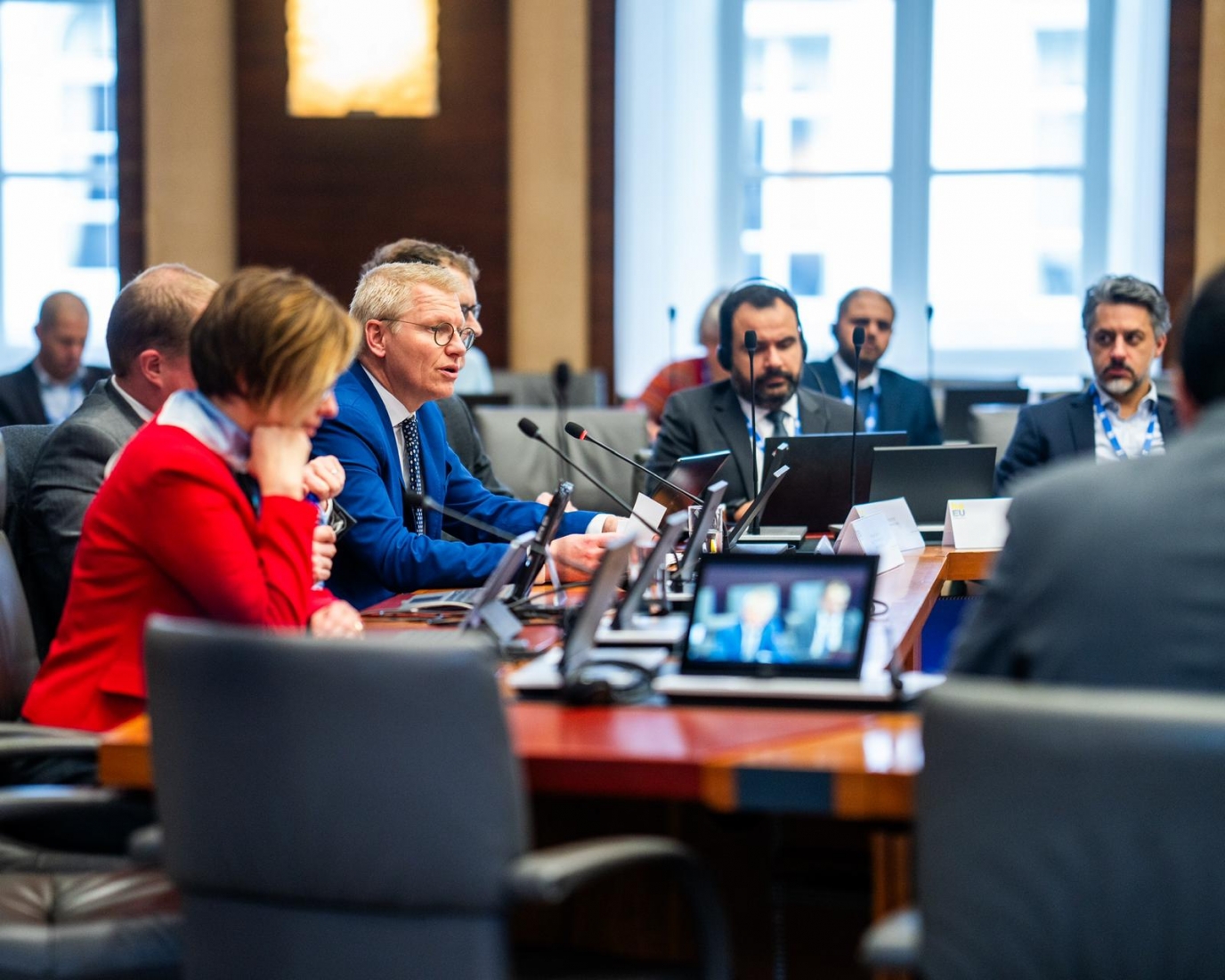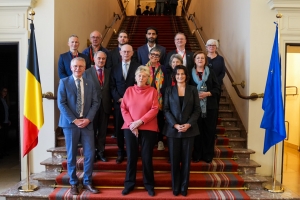High Level Conference on Road Control :Policy recommendations of the Belgian Presidency for the next legislature to improve safety, work conditions and fair competition in road transport
The Belgian Presidency of the European Union organized on the 23rd of February a high-level meeting on Road haulage Control 4 years after the adoption of the Mobility Package. Presentations and discussions took place on new tools for better road enforcement, the remaining challenges regarding social protection and fair competition and vision towards the future for the next European legislature. Around 115 participants attended the event, representing a large amount of Member States, the social partners and the relevant international organizations and institutions in charge of Road Control.

Deputy Prime Minister Georges Gilkinet : "In international road transport, too many drivers work in conditions unworthy of the 21st century, spending weeks and even months in their cabs, far from their country of origin, and without being able to lead a normal family life. Exacerbated competition is forcing some companies to cut prices by reducing labour costs, the only ones that can be reduced, or even by not complying with the rules in force, such as those on driving times and rest periods, or on secondment. In such a situation, everyone loses: workers, companies, but also road safety and the environment. This is why I intend, during this Belgian Presidency, to pursue and accentuate the advances made during the discussions on the Mobility Package, which is gradually being put in place within the European Union from 2020 onwards. This is the purpose of the Brussels Declaration presented today. It aims to chart a course for the future to make our roads safer, improve working conditions for drivers and make competition between companies fairer. This is our commitment for the next European legislature"
The Belgian Presidency, represented by Deputy Prime Minister Georges Gilkinet, with the support of Deputy Prime Minister Pierre-Yves Dermagne, in conclusion of the event, recommends the following points of action for the next few years to its fellow Member States and the EU Institutions:
Improving the working conditions of the truck drivers
- Truck drivers play a pivotal role in EU logistics and in the Green Transition, which must be reflected in high standards for working conditions and wages. We call for a fair road transport sector, with good social and working conditions.
- The race to the bottom of the last 2 decades in terms of poor working conditions and low wages to boost financial gains for some economic players in the sector led to a systematic driver shortage all across Europe, and prevents the attraction of young drivers to the profession, including women. We call for actions to make the profession of truck drivers more attractive, especially for women.
- The judgments of the Court of Justice of the European Union “Koelzsch” (case C-29/10) and “Voogsgeerd” (case C 384/10) need to be uniformly applied. Those judgments clarified that the country in which or from which the worker fulfills the essential part of his obligations towards his employer - taking into account all the elements which characterize the activity of the worker – should be regarded as the country in which or from which the worker habitually carries out his work.
Implementing the Mobility Package at EU and National level
- The new rules of the Mobility Package are not fully applied, and are sometimes interpreted differently amongst the different Member States. We call for action to ensure the full application of the social and environmental legislation on Road Transport.
- A uniform interpretation of the Posted Workers Directive (PWD) should be made more binding, notably on the definition of minimum wages.
- New tools like remote detection of infringements (DSRC) should be used to the full extent of their potential, allowing better targeted and more efficient controls.
- We must ensure that the European Register of Road Transport Undertakings (ERRU) is updated with the findings and condemnations collected by all countries and accessible to all relevant inspectorates all over the EU.
Strengthening European Institutions in charge of road enforcement
- Member States should invest in their enforcement capacities, mainly through appropriate levels of adequately skilled and trained staff.
- Cooperation and concertation between Member States should be encouraged in order to harmonize and optimize control methods and application of the rules as much as possible.
- The overall work of the European Labour Authority (ELA) is effective, relevant, useful and coherent. More powers should be given to ELA, providing specific EU funding for horizontal issues, and strengthening the role of National Liaison Officers (NLOs).
- In order to share good practices, further update the enforcement tools and methods and fight social dumping, the EU should establish a specific Agency in charge of road enforcement as already exists for each other mode of transport. This could be done by providing ELA with a stronger mandate and fundings, or by creating a brand new institution dedicated to road haulage enforcement.
- The first role of this institution should be to develop a multiannual action plan against fraud, unfair competition and social dumping. This institution should also assess annually the state of implementation of the Mobility Package rules in each Member State.
Strengthening the legislation to improve social and environmental conditions in the road transport sector
- Light freight vehicles have been partially included in the scope of Regulations only since the entry into force of the Mobility Package. Before that, only the largest vehicles used in international transport had been covered. The rise of e-commerce and urban deliveries are raising new questions and challenges for road safety, social standards and fair competition. The Commission should reflect on including all light freight vehicles in the scope of road transport regulations, such as access to the profession, driving and resting times.
- Drivers need to return home at regular intervals. The current rules are hard to enforce, and do not guarantee drivers get to enjoy a proper family life in their rest periods. The Commission should revise the rules in order to propose a minimum mandatory return that is more easily enforceable.
- The specific case of third country drivers needs to be addressed. While those drivers can be part of a short term answer for driver shortage problems on the short term, they need to receive the same level of social rights, health protection and wages. The Commission should in particular assess the situation of third country drivers and verify the compliance of all transport companies and Member States with the provisions of Regulation 1072/2009 (notably on driver attestations). ELA's mandate should be broadened to take into account third country drivers, reflecting a desire for inclusiveness. If necessary, the EU should take appropriate legislative measures to fix the problem.


